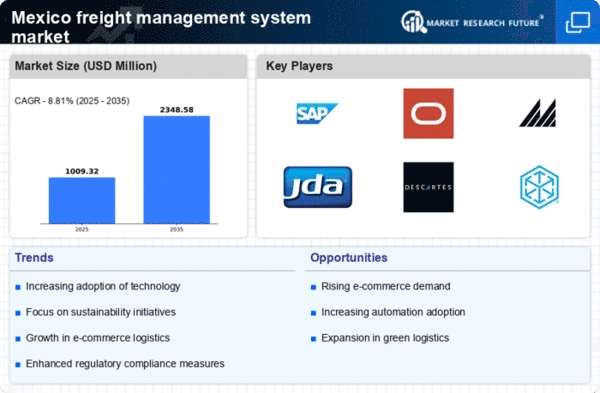Rising E-commerce Demand
The freight management-system market in Mexico is experiencing a notable surge due to the increasing demand for e-commerce. As online shopping continues to gain traction, logistics and freight services are under pressure to enhance their efficiency. In 2025, e-commerce sales in Mexico are projected to reach approximately $30 billion, which necessitates robust freight management solutions to handle the growing volume of shipments. This trend compels companies to adopt advanced freight management systems that can streamline operations, optimize routes, and reduce delivery times. Consequently, the freight management-system market is likely to expand as businesses seek to meet consumer expectations for fast and reliable delivery services.
Focus on Supply Chain Resilience
The freight management-system market is increasingly shaped by the need for supply chain resilience in Mexico. Companies are recognizing the importance of robust logistics strategies to mitigate disruptions and ensure continuity. In 2025, it is anticipated that 30% of businesses will prioritize investments in freight management systems that enhance supply chain visibility and flexibility. This focus on resilience is driven by the need to adapt to changing market conditions and consumer demands. As organizations seek to build more resilient supply chains, the freight management-system market is likely to experience growth, as these systems provide the necessary tools for effective risk management and operational agility.
Increasing Regulatory Compliance
The freight management-system market in Mexico is influenced by the growing emphasis on regulatory compliance. As the government implements stricter regulations regarding transportation safety and environmental standards, logistics companies must adapt their operations accordingly. In 2025, compliance costs are projected to account for approximately 15% of total logistics expenses. This necessitates the adoption of sophisticated freight management systems that can ensure adherence to regulations while optimizing operational efficiency. Consequently, the market is likely to see an uptick in demand for systems that facilitate compliance tracking and reporting, thereby supporting logistics providers in navigating the regulatory landscape.
Government Infrastructure Investments
The freight management-system market is poised for growth due to significant investments in infrastructure by the Mexican government. Initiatives aimed at improving transportation networks, such as highways and ports, are expected to enhance logistics capabilities. In 2025, the government has allocated over $10 billion for infrastructure projects, which will likely facilitate smoother freight operations. Enhanced infrastructure not only reduces transit times but also lowers operational costs for logistics providers. As a result, the freight management-system market is likely to benefit from these developments, as companies will require sophisticated systems to manage increased freight volumes and optimize their supply chains.
Technological Advancements in Logistics
Technological innovations are driving transformation within the freight management-system market in Mexico. The integration of technologies such as IoT, AI, and blockchain is revolutionizing logistics operations. In 2025, it is estimated that 40% of logistics companies in Mexico will adopt AI-driven solutions to enhance decision-making and operational efficiency. These advancements enable real-time tracking, predictive analytics, and improved inventory management. As logistics providers increasingly rely on technology to streamline their operations, the demand for advanced freight management systems is expected to rise, thereby propelling market growth.
















